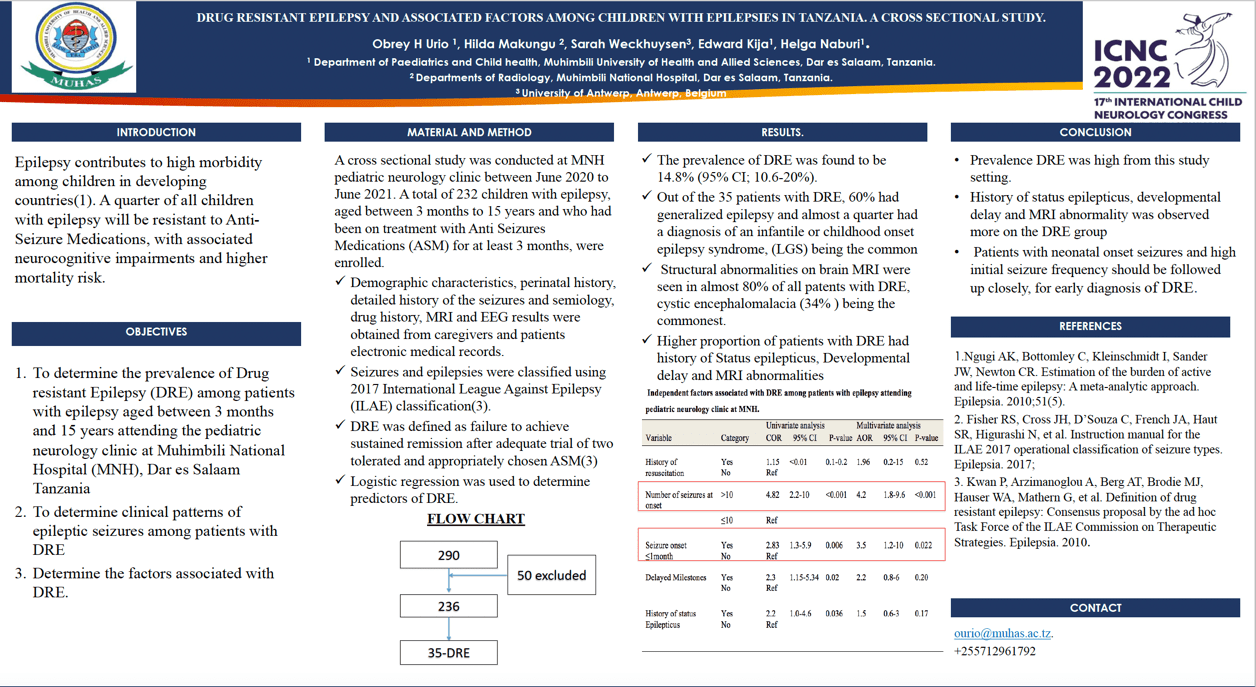DRUG RESISTANT EPILEPSY AND ASSOCIATED FACTORS AMONG CHILDREN WITH EPILEPSIES IN TANZANIA, A CROSS SECTIONAL STUDY
Obrey Urio, Helga Naburi, EDWARD KIJA
Background: Epilepsy is one of the most common neurological disorders affecting children. A quarter of all children with epilepsy are resistant to medical treatment with higher risk of morbidity and mortality. Objectives: We aimed to determine the prevalence of Drug Resistant Epilepsy (DRE) and associated factors among patients with epilepsies aged 3 months to 15 years attending pediatric neurology clinic at Muhimbili National Hospital (MNH), Dar es Salaam Tanzania.
Methods A cross sectional study was conducted at MNH pediatric neurology clinic between June 2020 to June 2021.A total of 232 children with epilepsies aged between 3 months to 15 years and who had been Anti Seizure Medications (ASM) for at least 3 months were enrolled. Demographic and clinical information was obtained from caregivers and patients electronic medical records. Logistic regression was used to determine independent predictors of DRE.
Results Prevalence of DRE was found to be 14.8%, 95% CI (10.6-20%). Out of 35 patients who were found to have with DRE, 60% had generalized epilepsy and almost a quarter had an epilepsy syndrome, the commonest being Lennox Gastaut Syndrome (LGS). Eighty percent of patients with DRE had structural correlates on brain MRI. Neonatal onset seizures (OR =3.5; 95% CI 1.2-10; P= 0.02) and high seizures frequency (OR=4.2; 95% CI 1.8-9.6; P=<0.001) were found to predict DRE.
Conclusion. Prevalence DRE was high in this study center. Patients with neonatal onset seizures and high seizures frequency should be followed up closely, for early diagnosis of DRE
Keywords: Drug Resistant Epilepsy, epilepsy,Intractable epilepsy
Obrey Urio
Muhimbili University of Health and Alleid Sciences
Tanzania
Helga Naburi
Muhimbili Univerity of Health and Allied Sciences
Tanzania
EDWARD KIJA
MUHIMBILI UNIVERSITY OF HEALTH AND ALLIED SCIENCES
Tanzania
Background: Epilepsy is one of the most common neurological disorders affecting children. A quarter of all children with epilepsy are resistant to medical treatment with higher risk of morbidity and mortality. Objectives: We aimed to determine the prevalence of Drug Resistant Epilepsy (DRE) and associated factors among patients with epilepsies aged 3 months to 15 years attending pediatric neurology clinic at Muhimbili National Hospital (MNH), Dar es Salaam Tanzania.
Methods A cross sectional study was conducted at MNH pediatric neurology clinic between June 2020 to June 2021.A total of 232 children with epilepsies aged between 3 months to 15 years and who had been Anti Seizure Medications (ASM) for at least 3 months were enrolled. Demographic and clinical information was obtained from caregivers and patients electronic medical records. Logistic regression was used to determine independent predictors of DRE.
Results Prevalence of DRE was found to be 14.8%, 95% CI (10.6-20%). Out of 35 patients who were found to have with DRE, 60% had generalized epilepsy and almost a quarter had an epilepsy syndrome, the commonest being Lennox Gastaut Syndrome (LGS). Eighty percent of patients with DRE had structural correlates on brain MRI. Neonatal onset seizures (OR =3.5; 95% CI 1.2-10; P= 0.02) and high seizures frequency (OR=4.2; 95% CI 1.8-9.6; P=<0.001) were found to predict DRE.
Conclusion. Prevalence DRE was high in this study center. Patients with neonatal onset seizures and high seizures frequency should be followed up closely, for early diagnosis of DRE
Keywords: Drug Resistant Epilepsy, epilepsy,Intractable epilepsy
Obrey Urio
Muhimbili University of Health and Alleid Sciences
Tanzania
Helga Naburi
Muhimbili Univerity of Health and Allied Sciences
Tanzania
EDWARD KIJA
MUHIMBILI UNIVERSITY OF HEALTH AND ALLIED SCIENCES
Tanzania

Obrey Urio
Muhimbili University of Health and Alleid Sciences
Tanzania
Muhimbili University of Health and Alleid Sciences
Tanzania